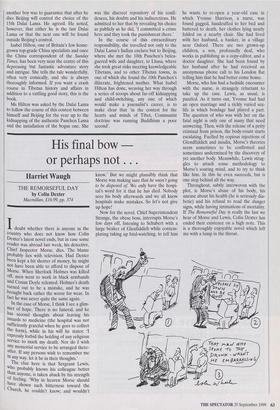• • •
His final bow or perhaps not
Harriet Waugh
THE REMORSEFUL DAY • by Colin Dexter Macmillan, £16.99, pp. 374 • by Colin Dexter Macmillan, £16.99, pp. 374 Idoubt whether there is anyone in the country who does not know how Colin Dexter's latest novel ends, but in case some reader was abroad last week, his detective, Chief Inspector Morse, dies. The blame probably lies with television. Had Dexter been kept a bit shorter of money, he might not have been able to afford to dispose of Morse. When Sherlock Holmes was killed off, men went to work in black armbands and Conan Doyle relented. Holmes's death turned out to be a mistake, and he was brought back rather the worse for wear. In fact he was never quite the same again. In the case of Morse, I think I see a glim- mer of hope. There is no funeral, and he has second thoughts about leaving his innards to medicine (the hospital was not sufficiently grateful when he goes to collect the form), while in his will he states: 'I expressly forbid the holding of any religious service to mark my death. Nor do I wish any memorial service to be arranged there- after. If any persons wish to remember me in any way, let it be in their thoughts.' The clue here is that Sergeant Lewis, who probably knows his colleague better than anyone, is taken aback by his strength of feeling. 'Why in heaven Morse should have shown such bitterness toward the Church, he couldn't know; and wouldn't know.' But we might plausibly think that Morse was making sure that he wasn't going to be disposed of. We only have the hospi- tal's word for it that he has died. Nobody sees his body afterwards and we all know hospitals make mistakes. So let's not give up hope!
Now for the novel. Chief Superintendent Strange, the obese boss, interrupts Morse's few days off, listening to Schubert with a large beaker of Glenfiddich while contem- plating taking up bird-watching, to tell him he wants to re-open a year-old case in which Yvonne Harrison, a nurse, was found gagged, handcuffed to her bed and battered to death, her clothes lying neatly folded on a nearby chair. She had lived with her husband, a banker, in a village near Oxford. There are two grown-up children, a son, profoundly deaf, who works in publishing as a copy-editor, and a doctor daughter. She had been found by her husband after he had received an anonymous phone call to his London flat telling him that he had better come home.
Morse, who has had a bedside encounter with the nurse, is strangely reluctant to take up the case. Lewis, as usual, is puzzled. As it turns out, Yvonne had had an open marriage and a richly varied sex- life in which bondage had played a part. The question of who was with her on the fatal night is only one of many that need answering. Then, with the release of a petty criminal from prison, the body-count starts escalating. Fuelled by copious injections of Glendfiddich and insulin, Morse's theories seem sometimes to be confirmed and sometimes undermined by the discovery of yet another body. Meanwhile, Lewis strug- gles to attach some methodology to Morse's soaring mind, and to try to think like him. In this he even succeeds, but is one step behind all the way.
Throughout, subtly interwoven with the plot, is Morse's abuse of his body, his unease about his health (he is seriously dia- betic) and his refusal to read the danger signs, while having intimations of mortality. If The Remorseful Day is really the last we hear of Morse and Lewis, Cohn Dexter has ended their existence on a high note. This is a thoroughly enjoyable novel which left me with a lump in the throat.


























































































 Previous page
Previous page